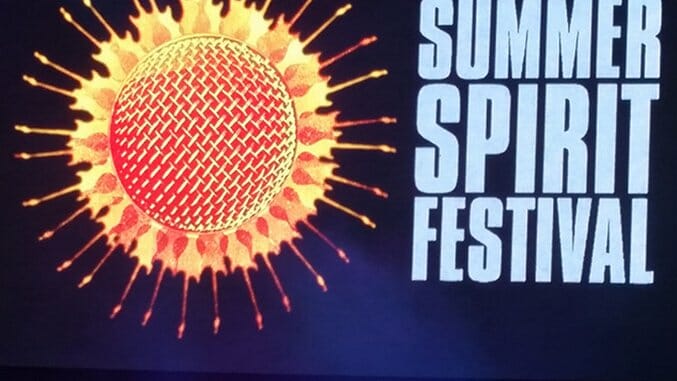Summer Spirit Festival 2016
Photo by Geoffrey Himes
“I will not commit nor will I submit to musical genocide,” Gregory Porter sang Saturday afternoon at the 11th annual Summer Spirit Festival. The burly jazz singer with the bushy beard and the weird black cap with ear flaps and a chin strap was pledging his devotion to the musics that are too often forgotten in this brave new world of hip-hop and dance-pop. “Give me a blues song,” he continued. “Tell the world what’s wrong. And what about the gospel singer, heavenly messages of love? And, oh, the soul man with your heart in his hand.”
The Summer Spirit Festival, held each August at the Merriweather Post Pavilion in Columbia, Maryland, is an unusual event, for it is devoted to rhythm & blues not as a nostalgic art form from the past but as a living, vibrant genre still finding ways to surprise us. This is not a festival where acts from Motown, Stax and Atlantic Records in the ‘60s are trotted out to do their old hits one more time. This is a showcase for artists who got started in the 1990s or 2000s to bring their newest creations to the stage.
The festival has always emphasized the progressive wing of the neo-soul movement: those artists who shrug off the clichés of diva warbling, sexual come-ons and robotic dance grooves to invent new ways of making music. Past headliners at the festival have included D’Angelo, Lauryn Hill, Anthony Hamilton and Floetry; this year’s headliners Erykah Badu, Jill Scott, Janelle Monae and the Roots were returning after past appearances. This approach has been so successful that this year the festival expanded from one day to two.
Porter may come out of the jazz world, but he has never been shy about his admiration for soul singers such as Donny Hathaway and Curtis Mayfield—and their influence is obvious in his approach. On Saturday Porter segued from a radical, acoustic-bass-driven arrangement of the Temptations’ “Papa Was a Rolling Stone” into “Musical Genocide.” At the end of the latter song, he begged that artists such as Hathaway, John Coltrane, Abbey Lincoln and Earth, Wind & Fire not be forgotten. His version of “On My Way to Harlem” included nods to both Duke Ellington and Marvin Gaye and segued into Gaye’s “What’s Going On,” which sounded timeless in an arrangement featuring tenor sax and acoustic piano.
But Porter was not paying tribute to the past so much as drawing strength from it, for the title tune from his recent album, Take Me to the Alley, is as good a song as we’ll get this year. When he describes a Pope Francis type figure forsaking the glitzy part of town to visit “the afflicted ones,” Porter lifts his voice atop a gospel-soul melody reconfigured by jazz harmony into something new.
Just as Porter comes out of the jazz scene, the Roots come out of hip-hop. But Jimmy Fallon’s house band has such close ties to the neo-soul movement via collaborators such as Badu, Scott and D’Angelo that the Philly group was a natural fit for the festival. And the Roots’ set Sunday was a perfect illustration of how they reach out to many different genres to make connections. Washington rapper DJ Kool made a guest appearance, as did an unidentified EDM DJ. The band’s guitarist Captain Kirk Douglas sang and soloed on an impressive rock number.
-

-

-

-

-

-

-

-

-

-

-

-

-

-

-

-

-

-

-

-

-

-

-

-

-

-

-

-

-

-

-

-

-

-

-

-

-

-

-

-








































